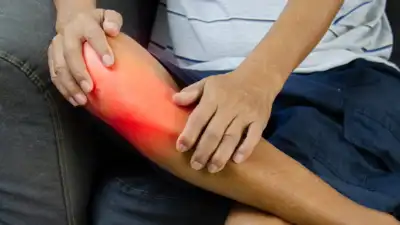ARTICLE AD BOX

For most older adults, the thought of lifting weights feels intimidating, even risky. Walking, yoga, or maybe a little stretching, those are considered “safe” options. Strength training? That’s for athletes or youngsters, right?Not quite.Fitness coach Navneeth Ramprasad has been challenging this myth, not just with clients but with the two people closest to him—his parents. A year ago, they were skeptical, even dismissive. Today, after 365 days of daily weightlifting and structured strength training, the results have left even their doctors surprised.And perhaps the most powerful change: his mother’s chronic knee pain, something she battled for years, has completely disappeared.The conversation that started it allOn his Instagram page dated August 18, Navneeth shared the story that has since struck a chord with thousands.“A year ago, my parents said, ‘Lifting weights? That’s for young people. We’re too old for all that. Walking is enough, no?’ They were wrong. And I’m glad I didn’t listen,” he wrote.Instead of pushing extreme gym workouts, he designed a simple, progressive plan that fit into their routine.
Basic compound movements. Moderate weights. Consistent practice. Nothing fancy. Just discipline.Twelve months later, the transformation wasn’t cosmetic; it was functional, medical, and deeply life-changing.Mom’s knee pain disappearedFor years, Navneeth’s mother had struggled with aching knees. Stairs were a daily battle. Standing for too long made her uncomfortable. Like many middle-aged and elderly women, she had accepted this as part of ageing.But instead of surgery or endless painkillers, Navneeth introduced a mix of squats, controlled leg extensions, and resistance work tailored for her capacity. The result shocked even her:She now climbs stairs without holding the railing. She no longer complains of pain after walking long distances. Her posture has improved, her balance feels steadier, and everyday movements no longer come with fear.For many families, this alone would be enough proof of strength training’s benefits.
But the story doesn’t stop there.Dad’s blood sugar dropped by 30 pointsNavneeth’s father had been managing borderline high blood sugar levels for years. Like many Indian households, diet fads had been tried and abandoned. Medication was an option, but lifestyle habits seemed harder to change.The solution turned out to be weights, not diets. With a mix of compound exercises like deadlifts, bench presses, and rows combined with consistent protein intake his father’s numbers dropped.In fact, his doctor was so surprised by the steady 30-point drop in blood sugar that he asked: “What are you doing differently?”The answer was simple: strength training. No crash diets. No miracle pills. Just muscle as medicine.Visible youth and energyWhat may be the most overlooked part of the story is how much stronger and more alive his parents look today. Friends and neighbors comment on their glowing skin, firmer posture, and brighter energy.Navneeth points out that this is not just about muscles. Resistance training increases circulation, stimulates collagen production, boosts bone density, and even sharpens brain health.“The most surprising part?” he says, “They now remind me if I miss a workout with them.”That’s perhaps the true definition of transformation not just physical, but in mindset.Why strength training matters for ageing?Medical experts worldwide are beginning to echo what fitness coaches like Navneeth have long believed: muscle is medicine.For bones: Weightlifting improves bone mineral density, reducing the risk of osteoporosis.For joints: Contrary to fear, strengthening surrounding muscles reduces joint pain, as seen in his mother’s knees.For metabolism: Muscle tissue burns more calories at rest, helping manage weight and blood sugar levels.For the brain: Studies suggest resistance training supports cognitive function, potentially protecting against dementia.Walking is healthy, yes. Yoga is helpful, yes. But as mentioned in Hindustan Times, Navneeth says, “Strength training is the cheapest health insurance you can give your parents.”Breaking the myth: “Too old for weights”Perhaps the biggest barrier is mindset. Older adults often fear injury, imagining heavy barbells and extreme gym routines. But strength training doesn’t need to look like a bodybuilding competition.It can start with:Bodyweight squats holding onto a chair.Light dumbbells for arm and shoulder exercises.Resistance bands for safe, joint-friendly workouts.Gradual progression, tailored to age and ability.It’s not about lifting the heaviest weights. It’s about consistency, technique, and building resilience.Navneeth’s parents prove that even starting late, results are profound.A year of disciplineWhat makes this story stand out is not a single dramatic before-and-after photo, but the accumulation of small, daily efforts.One year of showing up.One year of repeating basic lifts.One year of refusing excuses.And the outcome: a mother free from pain, a father with better health markers, and two parents who look and feel younger than they did a decade ago.If you’re convincing your parents…Navneeth’s message is simple and urgent:Strength training isn’t just for bodybuilders. It’s for every ageing body that wants to move without pain.It’s never too late to start. Whether you’re 40, 50, or 70, muscles respond to resistance.It’s the most affordable health insurance. Weights are cheaper than surgeries, and consistency beats medication in many lifestyle-related conditions.He often tells hesitant families: “You insure your car, your house, your phone. Why not your body?”A year ago, Navneeth’s parents doubted him. Today, they’ve become walking testimonials for the power of resistance training. Their journey shows that strength is not about age it’s about action.The next time someone says weightlifting is “too much” for older adults, this story stands as living proof that sometimes the best medicine isn’t found in a pill, but in a pair of dumbbells.And perhaps the most heartwarming part: It wasn’t about transforming appearances. It was about restoring independence, dignity, and joy in daily life.As Navneeth himself put it: “Muscle is medicine. And it’s never too late to start taking the dose.”Source: Hindustan Times



.png)
.png)
.png)
















 2 hours ago
2
2 hours ago
2









 English (US) ·
English (US) ·